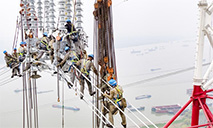Cherish peace, work together in unity, and pursue a win-win future for the Asia-Pacific
Address by Vice Foreign Minister Le Yucheng
At the Fourth International Forum on Security and Strategy
Friends,
Good morning. It is a great pleasure to see friends old and new. Meeting virtually will not impede our communication and exchange. At such a special moment in particular, there is a greater need to bring together different perspectives on the international developments and discuss the underlying trend in the Asia-Pacific region.
Speaking of international developments, the crisis in Ukraine is undoubtedly the biggest eye of the storm at the moment. Though the forum today is about the Asia-Pacific, we still have to start with Ukraine. On Ukraine, I am no stranger to the country. Being a student of the Russian language and Russian literature in university, I got to know about the Slavs first from Kievan Rus. In the diplomatic career, I visited Ukraine many times, and once drove across the country, west to east, on a road trip. It is deeply distressing and lamentable that a country I am very familiar with is now embroiled in conflict. This is not what we wish to see under any circumstances.
Since the crisis in Ukraine started, China has worked actively to promote dialogue for peace, voicing its support for peace and doing its best for talks. In the early days of the war, China proposed to Russia to hold peace talks with Ukraine, and received a positive response from the Russian side. Russia and Ukraine have since held four rounds of talks. At the recent virtual summit with leaders of France and Germany, President Xi Jinping emphasized support for peace negotiations. Last night, President Xi Jinping had a video call with US President Joe Biden upon request. The two sides had a candid and in-depth exchange of views on China-US relations and the situation in Ukraine. The call lasted for two hours. President Xi Jinping reiterated China’s basic position on the Ukraine issue. He pointed out that China stands for peace and opposes war, advocates upholding international law and universally recognized norms governing international relations. China adheres to the UN Charter and promotes the vision of common, comprehensive, cooperative and sustainable security. All sides need to jointly support Russia and Ukraine in having dialogue and negotiation that will produce results and lead to peace. President Xi Jinping quoted two Chinese sayings: “It takes two hands to clap” and “He who tied the bell to the tiger must take it off.” He urged the parties involved to demonstrate political will and keep the dialogue and negotiation going. The US and NATO should also have dialogue with Russia to address the crux of the Ukraine crisis and ease the security concerns of both Russia and Ukraine. President Xi Jinping stressed that an enduring solution to security would be for major countries to respect each other, reject the Cold War mentality, refrain from bloc confrontation, and build step by step a balanced, effective and sustainable security architecture for the region and for the world. President Biden expounded on the US position, and expressed readiness for communication with China to prevent the situation from exacerbating.
Friends,
The European continent is a key region for world peace. It was marred by two World Wars and was not tranquil after the Cold War. Now flames of war are reignited. This is indeed deeply distressing and more importantly, should prompt us to profoundly reflect. I recall clearly that several Western strategists including George Kennan, Henry Kissinger and John Mearsheimer all sounded an alarm years ago, yet the situation still comes to what we see today. The lesson is hard and painful. And the root cause lies in the Cold War mentality and power politics.
First, one should not seek its own absolute security. Since NATO promised that it would move “not one inch eastward”, it should not renege on its word and keep pushing its boundary eastward by up to one thousand kilometers. Should this enlargement go further, it would be approaching the “outskirts of Moscow” where a missile could hit the Kremlin within seven or eight minutes. The Cuban Missile Crisis has offered a lesson. Such pursuit of absolute security actually leads to absolute insecurity. Pushing a major country, especially a nuclear power, to the corner would entail repercussions too dreadful to contemplate.
Second, bloc politics and group confrontation should be rejected. Military bloc is a Cold War vestige. NATO and the Warsaw Pact were at loggerheads for nearly half a century. With the disintegration of the Soviet Union, NATO should have been consigned to history alongside the Warsaw Pact. However, rather than breaking up, NATO has kept strengthening and expanding, and intervened militarily in countries like Yugoslavia, Iraq, Syria and Afghanistan. In recent years, it even went so far as to flex muscle in the Asia-Pacific. One could well anticipate the consequences going down this path. The crisis in Ukraine is a stern warning.
Third, globalization should not be “weaponized”. China has all along opposed unilateral sanctions that have neither basis in international law nor mandate of the Security Council. History has shown time and again that instead of solving problems, imposing sanctions is like “putting out fire with firewood” and will only make things worse. Sanctions against Russia are now going to such lengths that globalization is used as a weapon, even people from the sports, cultural, art and entertainment communities are not spared, cats and trees are sanctioned, and the overseas assets of Russian citizens are seized groundlessly. The West has long espoused the ideas of “science without borders”, “non-politicization of sports”, the sanctity and inviolability of private property, freedom of speech and the spirit of honoring contracts, etc. I’m afraid no one would believe in them any more. Do these sanctions intend to bring human society back to a primitive stage where communities are isolated and have nothing to do with each other? Sanctions would only bring harm to the people, disrupt the post-war economic and financial systems, and weigh on the struggling world economy. At least from what we see lately, the risks of a food crisis, energy crisis and financial crisis are all mounting. Oil price surged to over 130 US dollars per barrel, and the price of natural gas in Europe saw a ten-fold spike over the same period last year. The abuse of sanctions will bring catastrophic consequences for the entire world.
Fourth, small countries should not be used as a pawn. As we see in the world today, some big countries do not want to get dragged into conflicts and bring harm to themselves, so they make empty promises to small countries, turn small countries into their cat’s paw and even use them to fight proxy wars. A NATO commitment of no eastward expansion could have easily ended the crisis and stopped the sufferings. Instead, one chose to fan the flames at a safe distance, watching its own arms dealers, bankers and oil tycoons make a fortune out of the war while leaving people of a small country with the wounds of war that would take years to heal. This is highly immoral and irresponsible.
Friends,
The Ukraine crisis keeps the world on edge. It also provides a mirror for us to observe the situation in the Asia-Pacific. We cannot but ask, how can we prevent a crisis like this from happening in the Asia-Pacific?
The Asia-Pacific is home to half the world’s population, and accounts for 60% of global GDP. It is an anchor for world peace and stability, an engine for global growth and a new pace-setter in international cooperation. Such a promising situation has not come easily and should be cherished by all sides. On the other hand, the Asia-Pacific now faces two opposite choices: should we build an open and inclusive family for win-win cooperation or go for small blocs based on the Cold War mentality and group confrontation? My answer can be summed up as four “dos” and four “don’ts”:
First, we must cherish peace and not undermine regional tranquility. The Asia-Pacific has enjoyed overall peace for several decades. This is not a gift from heaven but the result of the joint and dedicated efforts of all countries in the region. It was in Asia that the Five Principles of Peaceful Co-existence and the ten principles of the Bandung Conference were first proposed. Asia is also the birthplace of the Shanghai Communiqué between China and the United States. Eight years ago, President Xi Jinping put forth the vision of common, comprehensive, cooperative and sustainable security. This vision, which was oriented toward Asia in the first place, is particularly relevant in the current context. No country should pursue its so-called absolute security at the expense of other countries’ security. Otherwise, as the proverb goes, “One who tries to blow out other’s oil lamp will get his beard on fire.”
Second, we must respect each other and not wantonly interfere in others’ internal affairs. Despite the diverse civilizations and national conditions, Asian countries have sustained prosperity and stability for half a century. The key lies in the Asian way of mutual respect and consensus building. Countries should respect each other’s sovereignty and territorial integrity, and refuse to do unto others what they would not want for themselves. Every country has the right to pursue a development path chosen by itself. Imposition or interference in others’ internal affairs should be rejected, and there is no need for “saviors” or “lecturers” .
Third, we must promote unity and cooperation and not create division and confrontation. The Asia-Pacific has maintained vibrancy in a fluid and changing world. This is the result of united efforts by all regional countries. If we are pit against each other and engage in incessant infighting, we would put regional prosperity and stability in serious jeopardy. Now some country insists on going against the trend to pursue the Indo-Pacific strategy, provoke trouble, put together closed and exclusive small circles or groups, and get the region off course toward fragmentation and bloc-based division. Such an Indo-Pacific Strategy is as dangerous as the NATO strategy of eastward expansion in Europe. If allowed to go on unchecked, it would bring unimaginable consequences, and ultimately push the Asia-Pacific over the edge of an abyss.
Fourth, we must pursue independence and self-strength and not let others decide our future. Pursuing divide-and-rule by stoking tensions to achieve offshore balancing is the modus operandi of hegemony. We in Asia must all stay alert about this and keep the future firmly in our own hands, instead of simply succumbing to others’ interests or becoming an easy pawn of others. We need to take the purposes and principles of the UN Charter as the fundamental guidance, and keep an objective and just position on international affairs. We need to make independent assessments and decisions in our own best interests, pursue independent, balanced and prudent foreign policies, and seek strength through unity in the process of regional integration.
China stands ready to work with all countries in the Asia-Pacific under the banner of true multilateralism, to promote enduring peace, common development and open regionalism, and jointly open up brighter prospects for the Asia-Pacific community with a shared future.
Source: Ministry of Foreign Affairs
Photos
Related Stories
- Chinese vice FM calls for cherishing peace, pursuing win-win future for Asia-Pacific
- U.S., NATO hold key to solving Ukraine crisis: FM spokesperson
- Chinese FM meets with secretary-general of SCO
- What does Foreign Minister's Press Conference at this year's Two Sessions signal?
- Algerian, Tanzanian and Zambian FMs to visit China
Copyright © 2022 People's Daily Online. All Rights Reserved.










